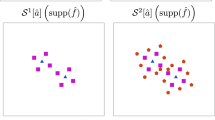Abstract
In this paper, we study the effect the choice of mesh quality metric, preconditioner, and sparse linear solver have on the numerical solution of elliptic partial differential equations (PDEs). We smoothe meshes on several geometric domains using various quality metrics and solve the associated elliptic PDEs using the finite element method. The resulting linear systems are solved using various combinations of preconditioners and sparse linear solvers. We use the inverse mean ratio and vertex condition number metrics in addition to interpolation-based, scale-variant and scale-invariant metrics. We employ the Jacobi, incomplete LU, and SSOR preconditioners and the conjugate gradient, minimum residual, generalized minimum residual, and bi-conjugate gradient stabilized solvers. We focus on determining the most efficient quality metric/preconditioner/linear solver combination for the numerical solution of various elliptic PDEs.
Access this chapter
Tax calculation will be finalised at checkout
Purchases are for personal use only
Preview
Unable to display preview. Download preview PDF.
Similar content being viewed by others
References
Babuska, I., Suri, M.: The p and h-p versions of the finite element method, basic principles, and properties. SIAM Rev. 35, 579–632 (1994)
Berzins, M.: Solution-based mesh quality for triangular and tetrahedral meshes. In: Proc. of the 6th International Meshing Roundtable, Sandia National Laboratories, pp. 427–436 (1997)
Berzins, M.: Mesh quality - Geometry, error estimates, or both? In: Proc. of the 7th International Meshing Roundtable, Sandia National Laboratories, pp. 229–237 (1998)
Fried, E.: Condition of finite element matrices generated from nonuniform meshes. AIAA Journal 10, 219–221 (1972)
Shewchuk, J.: What is a good linear element? Interpolation, conditioning, and quality measures. In: Proc. of the 11th International Meshing Roundtable, Sandia National Laboratories, pp. 115–126 (2002)
Du, Q., Huang, Z., Wang, D.: Mesh and solver co-adaptation in finite element methods for anisotropic problems. Numer. Methods Partial Differential Equations 21, 859–874 (2005)
Du, Q., Wang, D., Zhu, L.: On mesh geometry and stiffness matrix conditioning for general finite element spaces. SIAM J. Numer. Anal. 47(2), 1421–1444 (2009)
Ramage, A., Wathen, A.: On preconditioning for finite element equations on irregular grids. SIAM J. Matrix Anal. Appl. 15, 909–921 (1994)
Chatterjee, A., Shontz, S.M., Raghavan, P.: Relating Mesh Quality Metrics to Sparse Linear Solver Performance. In: SIAM Computational Science and Engineering, Costa Mesa, CA (2007)
Mavripilis, D.: An assessment of linear versus nonlinear multigrid methods for unstructured mesh solvers. J. Comput. Phys. 175, 302–325 (2002)
Batdorf, M., Freitag, L., Ollivier-Gooch, C.: Computational study of the effect of unstructured mesh quality on solution efficiency. In: Proc. of the 13th CFD Conference. AIAA, Reston (1997)
Freitag, L., Ollivier-Gooch, C.: A cost/benefit analysis of simplicial mesh improvement techniques as measured by solution efficiency. Internat. J. Comput. Geom. Appl. 10, 361–382 (2000)
Brewer, M., Freitag Diachin, L., Knupp, P., Leurent, T., Melander, D.: The Mesquite Mesh Quality Improvement Toolkit. In: Proc. of the 12th International Meshing Roundtable, Sandia National Laboratories, pp. 239–250 (2003)
Balay, S., Buschelman, K., Gropp, W.D., Kaushik, D., Knepley, M.G., McInnes, L.C., Smith, B.F., Zhang, H.: PETSc Webpage (2009), http://www.mcs.anl.gov/petsc
Becker, E.B., Carey, G.F., Oden, J.T.: Finite Elements: An Introduction. Prentice-Hall, Englewood Cliffs (1981)
Munson, T.: Mesh Shape-Quality Optimization Using the Inverse Mean-Ratio Metric. Mathematical Programming 110, 561–590 (2007)
Knupp, P.: Achieving finite element mesh quality via optimization of the Jacobian matrix norm and associated quantities, Part II - A framework for volume mesh optimization and the condition number of the Jacobian matrix. Internat. J. Numer. Methods Engrg. 48, 1165–1185 (2000)
Nocedal, J., Wright, S.: Numerical Optimization, 2nd edn. Springer, Heidelberg (2006)
Baker, A.H., Jessup, E.R., Kolev, T.V.: A simple strategy for varying the restart parameter in GMRES(m). J. Comput. Appl. Math. 230, 751–761 (2009)
Barrett, R., Berry, M., Chan, T.F., Demmel, J., Donato, J., Dongarra, J., Eijkhout, V., Pozo, R., Romine, C., Van der Vorst, H.: Templates for the Solution of Linear Systems: Building Blocks for Iterative Methods, 2nd edn. SIAM, Philadelphia (1994)
Saad, Y.: Iterative Methods for Sparse Linear Systems, 2nd edn. Society for Industrial and Applied Mathematics (2003)
Cyberstar Webpage, http://www.ics.psu.edu/research/cyberstar/index.html
Shewchuk, J.R.: Triangle: Engineering a 2D Quality Mesh Generator and Delaunay Triangulator. In: Lin, M.C., Manocha, D. (eds.) FCRC-WS 1996 and WACG 1996. LNCS, vol. 1148, pp. 203–222. Springer, Heidelberg (1996)
Si, H.: TetGen - A Quality Tetrahedral Mesh Generator and Three-Dimensional Delaunay Triangulator, http://tetgen.berlios.de/
Author information
Authors and Affiliations
Editor information
Editors and Affiliations
Rights and permissions
Copyright information
© 2010 Springer-Verlag Berlin Heidelberg
About this paper
Cite this paper
Kim, J., Sastry, S.P., Shontz, S.M. (2010). Efficient Solution of Elliptic Partial Differential Equations via Effective Combination of Mesh Quality Metrics, Preconditioners, and Sparse Linear Solvers. In: Shontz, S. (eds) Proceedings of the 19th International Meshing Roundtable. Springer, Berlin, Heidelberg. https://doi.org/10.1007/978-3-642-15414-0_7
Download citation
DOI: https://doi.org/10.1007/978-3-642-15414-0_7
Publisher Name: Springer, Berlin, Heidelberg
Print ISBN: 978-3-642-15413-3
Online ISBN: 978-3-642-15414-0
eBook Packages: EngineeringEngineering (R0)




